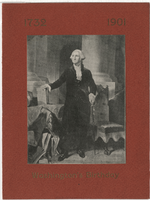Search the Special Collections and Archives Portal
Search Results
J. D. Morris oral history interview
Identifier
Abstract
Oral history interview with J. D. Morris conducted by his son, Dan Morris, in approximately 1974 for the Ralph Roske Oral History Project on Early Las Vegas. In this interview, Morris discusses moving to Southern Nevada in 1942 and life in Caliente, Nevada during that time. He describes the mining and railroad activity near Caliente, as well as his career as a jeweler and watchmaker. Morris also discusses gambling in Southern Nevada, nuclear weapons tests, and how the cities in Southern Nevada have expanded.
Archival Collection
H. P. Fitzgerald oral history interview
Identifier
Abstract
Oral history interview with H. P. Fitzgerald conducted by Wymon Henderson on March 14, 1981 for the Ralph Roske Oral History Project on Early Las Vegas. Fitzgerald discusses black history in Las Vegas, Nevada, school integration, and being one of the first black administrators for Clark County School District.
Archival Collection
H. P. Fitzgerald oral history interview
Identifier
Abstract
Oral history interview with H. P. Fitzgerald conducted by Kathlyn Wilson on March 09, 1975 for the Ralph Roske Oral History Project on Early Las Vegas. Fitzgerald discusses black history in Las Vegas, Nevada. He also talks about school integration and being one of the first black administrators for Clark County School District.
Archival Collection
D. L. Newell oral history interview
Identifier
Abstract
Oral history interview with D. L. Newell conducted by Paula Sue Curry on February 26, 1977 for the Ralph Roske Oral History Project on Early Las Vegas. In this interview, Newell describes life in Henderson, Nevada during the 1950s and how the city has changed. Newell discusses the companies that established chemical and metal plants in Henderson, how the growth of Las Vegas, Nevada affected Henderson, and the history of gambling in Southern Nevada. He also talks about mining, medical care available in Henderson, local celebrations, and pollution caused by chemical and metal plants.
Archival Collection
Mary M. Gafford oral history interview
Identifier
Abstract
Oral history interview with Mary M. Gafford conducted by Claytee D. White on September 24, 2021 for the Boyer Early Las Vegas Oral History Project.
Mary Gafford discusses her 30 year teaching career for the Clark County School District (CCSD) and her community service projects working with organizations such as the American Association of University Women (AAUW), the Mayflower Society, the Nevada Statehood Sesquicentennial, and the Nevada Women's History Project.
Archival Collection

Washington's birthday at the Hotel Atlas, menu, Friday, February 22, 1901
Date
Archival Collection
Description
Text

Laurents Bañuelos-Benitez oral history interview: transcript
Date
Archival Collection
Description
Oral history interview with Laurents Bañuelos-Benitez conducted by Rodrigo Vazquez and Barbara Tabach on June 16, 2021 for the Latinx Voices of Southern Nevada Oral History Project. Laurents is a Las Vegas native, graduate of Clark High School, and son of Mexican and Salvadoran immigrants. He is currently an English teacher at Rancho High School and was a former student worker on the Latinx Voices project.
Text
David Torres oral history interview
Identifier
Abstract
Oral history interview with David Torres conducted by David Schwartz on May 21, 2015 for the Table Games Management Oral History Project. In this interview, Torres talks about his career card dealing in Las Vegas, Nevada at the El Cortez, Barbary Coast, Stardust, Rio, Palms, M, and Cosmopolitan casinos.
Archival Collection
Mary Wesley oral history interview
Identifier
Abstract
Oral history interview with Mary Wesley conducted by Claytee D. White on October 22, 2007 for the UNLV University Libraries Oral History Collection. In this interview, Wesley discusses her early life in Quitman, Mississippi. She recalls the racism she experienced during her youth, the church community in Quitman, and traveling to Las Vegas, Nevada by train. She talks about the welfare rights movement in Las Vegas, Operation Life, and businesses on Jackson Street. Lastly, Wesley describes the entertainment on the Westside, and integration on the Las Vegas Strip.
Archival Collection
Emma Stampley oral history interview
Identifier
Abstract
Oral history interview with Emma Stampley conducted by Claytee D. White on October 22, 2007 for the UNLV University Libraries Oral History Collection. In this interview, Stampley discusses her early life in Fayette, Mississippi and growing up in a family of farmers. She remembers segregated schools, the living conditions during that time, and moving to Las Vegas, Nevada in 1968. Stampley talks about participating in the civil and welfare rights movements, and the foundation of Operation Life. Lastly, Stampley recalls traveling to civil and welfare rights movement marches, police harassment, and the African American experience in Las Vegas during that time.
Archival Collection
